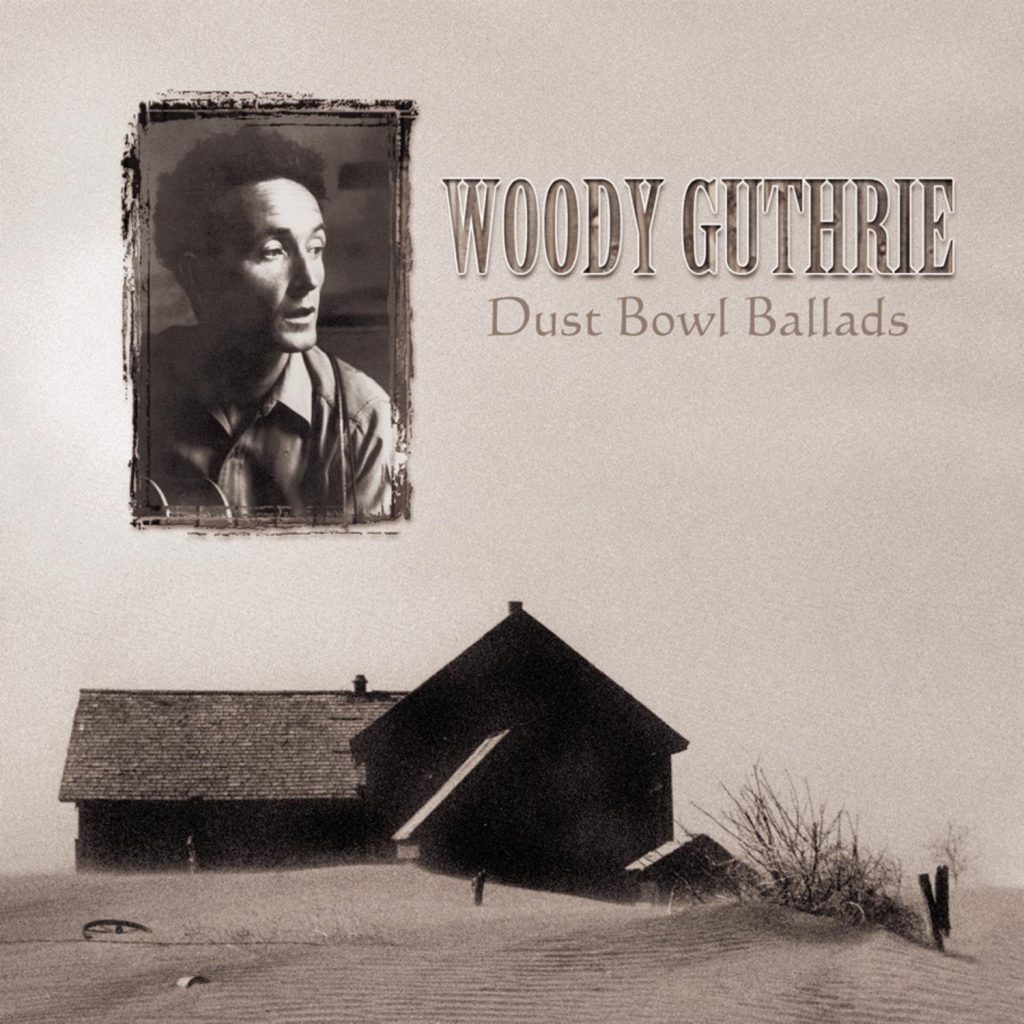
Remember that song you sang in grade school, “This land is your land/this land is my land/from California/to the New York Islands”? Who doesn’t? That song was written by a certain Woodrow Wilson Guthrie, who can possibly lay the claim to be the most influential American songwriter of all time. That’s a pretty bold statement for me to make, but when you listen to many of the other folk musicians that rose out of the twentieth century, they all lift material off Guthrie. From Dylan to Seeger to Springsteen, Guthrie is the root of many branches that have sprouted in the American folk and rock scene. What you may not remember, or even know, is that “This Land Is Your Land” was a political protest song against the nationalism and patriotism of Irving Berlin’s “God Bless America” being played incessantly on the radio.
Woody Guthrie was a man who constantly lived on the run. His whole life, he was on the run from the Huntington’s Disease, which previously had claimed the life of his mother. Guthrie was also on the run from the poverty of the Great Depression and the endless blight of the Dust Bowl in the 1930s. Guthrie ran towards something for most of his life as well, “bound for glory”, in his own words. He may in fact have found it, but only after a long and difficult quest, the details of which are revealed in his 1940 album, Dust Bowl Ballads.
For readers who may not know, the Dust Bowl was a drought that occurred in the American Midwest during the Depression in the 1930s. The scope of the drought was enormous, centering in Kansas but extending outwards to Colorado, Nebraska, Oklahoma, and Guthrie’s home state of Texas, along with many other states and parts of states. Today, it’s ranked as a natural disaster alongside the Great Chicago Fire, the San Francisco Earthquake, and Hurricane Katrina. But, while many of the aforementioned disasters were sudden cataclysms that did their work with swift deadliness, the Dust Bowl worked slowly over the course of a decade to sap the life from the inhabitants of the American Midwest, resulting in many years where almost no precipitation was seen, making already financially difficult times even more so. Guthrie and his family were one of the many who realized that there was no prosperity to be had in the bone-dry land of Texas, so Guthrie left his family and struck out for California like so many others, hoping to find a way to make a living. It is out of this period of his life whence Dust Bowl Ballads comes. Dust Bowl Ballads ranks on par with John Steinbeck’s novel The Grapes of Wrath as one of the foremost works of art that brought the struggles of the Depression to the front of American consciousness. Guthrie even has a two-part song entitled “Tom Joad” on the record, which retells the novel in song. However, Dust Bowl Ballads holds a forever unique place in record music history as most likely the first album to feature a continuous narrative theme – the first concept album, if you will.
Of course, Guthrie’s music is, like all great art, political. But Guthrie, the clever songwriter that he is, often relates his politics by narrowing his to a particular story for a song. He observes the microcosmos and fits them into their place in the macrocosmos. Take, as an example, “Blowin’ Down This Road”, telling the simple story of a mistreated vagabond trudging down the road, hoping to make it to where “the water tastes like wine”. On the surface, it’s a pretty straightforward account of Guthrie’s story, as well as many others. Like many of the songs on this record, it’s told as plainly as possible, with minimal figurative language. Nevertheless, when the narrator of the song shouts: “I ain’t gonna be treated this-a way!”, we sense both the personal urgency of a personal situation and the broad urgency of a national situation, the helplessness of many vagabonds suffering abuse by the wealthy and the government. Woody’s simplicity is actually his greatest strength. Many songwriters are praised for their command over elaborate and sometimes extravagant poetic language. For Guthrie, simple, sing-along choruses like “So Long (It’s Been God to Know You)” and “Do Re Mi” are their enduring strengths. They’re written for the people they’re written about – common folk scraping dollars together to get by. It’s a lofty achievement that Guthrie claims here, a gold standard chased by many an American songwriter, but rarely ever realized.
Guthrie’s Dust Bowl Ballads is a landmark of American folk music and tradition that certainly deserves to be studied and enjoyed to this day. Often, popular music helps people to sort out and work through the social problems and issues of the current day. The 1930s, a period where recorded music was not nearly as prevalent as in the present, can be illuminated and seen through the light of song and poetry with this record. Guthrie’s voice is nothing special; he has a very plain, blunt singing style. His guitar amounts to simple strumming with melodic voicings that any guitar student can nail with minimal practice. His lyricism is concise and direct, lacking the extravagant metaphors that sometimes characterized his followers. And yet, that directness only makes his political poetry even stronger, even more prevalent when listening today. Guthrie’s bold statement, a Depression-era concept album of hard times and tragedy, has become the root of a great, wonderful tree that forms the body of modern American folk music.
Comments are closed.